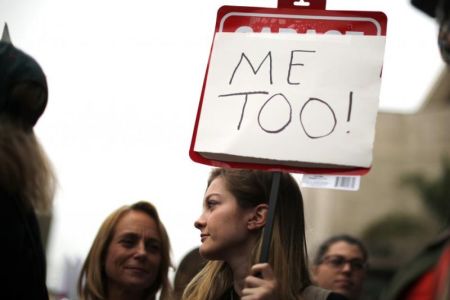What Americans Consider Sexual Harassment: Barna

Numerous allegations of high-profile men abusing their power have been made in recent weeks, but what really counts as sexual harassment? To help answer this question, Barna conducted a national survey of U.S. adults.
Asked to identify specific acts that they consider to be sexual harassment, 96 percent of women and 86 percent of American men said it is most often about being touched or groped, according to the survey conducted between Oct. 19 and 25. And 91 percent of women and 83 percent of men say it's about being forced to do something sexual.
The respondents spoke of other extremes too. They include someone touching themselves intentionally or masturbating, as mentioned by 89 percent of women and 76 percent of men.
Eighty-six percent of women and 70 percent of men also said harassment is about making sexual comments about someone's looks or body, and 85 percent of women and 71 percent of men said it's about sharing intimate photos or videos of someone without their permission.
The survey also revealed that three in 10 American adults have been sexually harassed. Women in this group report experiencing it almost three times more than men, 42 percent versus 16 percent.
Younger generations also report harassment at a higher rate, Barna added, saying millennials (31 percent) and Gen X (35 percent) are twice as likely as elders (16 percent) to say they have been sexually harassed, with Boomers somewhere in the middle (26 percent).
Fifteen percent of all adults also said they have witnessed sexual harassment, and almost one-quarter said someone they know well was sexually harassed, according to the report, which added that the majority of American adults, 52 percent, still says they have not encountered sexual harassment in any of these ways.
The survey also found that among those who have personally been harassed, have witnessed a harassment or know someone who has been harassed, the nature of that behavior was primarily either verbal (77 percent) or physical (67 percent), as opposed to online or through social media (22 percent).
Barna decided to conduct the survey after dozens of women in October accused the Hollywood producer Harvey Weinstein of sexual harassment, sexual assault, or rape. Following the publication of first allegations, Weinstein was fired from his company, The Weinstein Company, and also expelled from the Academy of Motion Picture Arts and Sciences and other professional associations.
Earlier this month, a woman named Leigh Corfman accused Republican GOP candidate for U.S. Senate Roy Moore of initiating sexual encounters with her when she was 14. Three other women came forward, alleging Moore attempted to date them when they were between the ages of 16 and 18 and he was in his early 30s, though they clarified that they did not engage in any sort of sexual contact, and it was not illegal to date at that age. Alabama resident Beverly Young Nelson also alleged that Moore groped her and tried to force her to perform oral sex when she was just 16. Later, several other women made similar accusations.
Alabama is expected to hold a special election on Dec. 12 to fill the Senate seat vacated by Attorney General Jeff Sessions.
Sen. Al Franken, a Democrat from Minnesota, has also been accused of sexual misconduct. Earlier this month, Los Angeles talk show host Leeann Tweeden wrote a blog describing how Franken gave her an unwanted kiss and put his hands on her breasts when she was asleep during a return flight from a 2006 USO tour in the Middle East.
Other women have made similar accusations of Franken inappropraitely touching them in public.





















